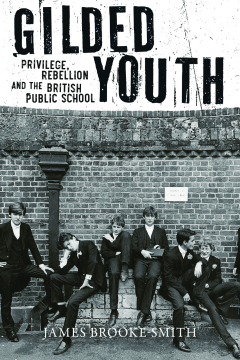
Additional Information
Book Details
Abstract
The British public school is an iconic institution, a training ground for the ruling elite and a symbol of national identity and tradition. But beyond the elegant architecture and evergreen playing fields is a turbulent history of teenage rebellion, sexual dissidence, and political radicalism. James Brooke-Smith wades into the wilder shores of public-school life over the last three hundred years in Gilded Youth. He uncovers armed mutinies in the late eighteenth century, a Victorian craze for flagellation, dandy-aesthetes of the 1920s, quasi-scientific discourse on masturbation, Communist scares in the 1930s, and the salacious tabloid scandals of the present day.
Drawing on personal experience, extensive research, and public school representations in poetry, school slang, spy films, popular novels, and rock music, Brooke-Smith offers a fresh account of upper-class adolescence in Britain and the role of elite private education in shaping youth culture. He shows how this central British institution has inspired a counterculture of artists, intellectuals, and radicals—from Percy Shelley and George Orwell to Peter Gabriel and Richard Branson—who have rebelled against both the schools themselves and the wider society for which they stand. Written with verve and humor in the tradition of Owen Jones’s The Establishment: And How They Get Away With It, this highly original cultural history is an eye-opening leap over the hallowed iron gates of privilege—and perturbation.
"Deplore it or revere it, you cannot but respect the private school industry's wart-like survival in modern Britain. . . . The class that runs Britain has always practiced tolerance and absorption of its enemies and critics as a strategy in its long survival. Brooke-Smith’s highly entertaining cultural history of the British public school has many examples of this tendency."
— Alex Renton, Spectator
"[Gilded Youth] comes dripping with liberal guilt. . . . He simply hates the institution and wants it demolished forthwith."
— Private Eye
"[An] entertaining and rather racy history of subversiveness at the great public schools. . . . The details are glorious and told with relish."
— Financial Times
"Gilded Youth is an entertaining but serious study of how public schools came about, their history, and their preeminent position today."
— Country Life
“[Brooke-Smith’s] thesis is spot on—that the public school rebels who embrace counterculture can still rely on rich families, powerful contacts, and polished manners to get them through.”
— Catholic Herald
"For a scholarly study of the British educational system’s upper tier, Gilded Youth is unusually rife with tension. . . . The commitment to impartiality is elegantly set down in a chapter about the 'secret life' of the Victorian schoolboy. . . . Yet it soon becomes clear that he was asked to leave the public school at which he fetched up (Shrewsbury) in his mid-teens, hates the institution that nurtured him like poison, and would like to see its playing fields dug up for cabbages. All this gives these well-researched pages on the theme of public school 'rebellion' an undeniable piquancy."
— Guardian
James Brooke-Smith is associate professor of English literature at the University of Ottawa. His writing has appeared in the Times Literary Supplement, Village Voice, and Public Books.
Table of Contents
| Section Title | Page | Action | Price |
|---|---|---|---|
| Cover | Cover | ||
| Title Page | 3 | ||
| Imprint Page | 4 | ||
| Contents | 5 | ||
| Introduction: Permanent Adolescence | 7 | ||
| One: Floreat Seditio | 23 | ||
| Two: Thomas Arnold’s Schooldays | 51 | ||
| Three: The Secret Life of the Victorian Schoolboy | 79 | ||
| Four: Classics and Nonsense | 113 | ||
| Five: Athletes and Aesthetes | 141 | ||
| Six: Red Menace | 171 | ||
| Seven: Going Underground | 201 | ||
| Eight: The Ordinary Elite | 235 | ||
| Afterword | 257 | ||
| References | 261 | ||
| Select Bibliography | 277 | ||
| Acknowledgements | 287 | ||
| Photo Acknowledgements | 289 | ||
| Index | 291 |
